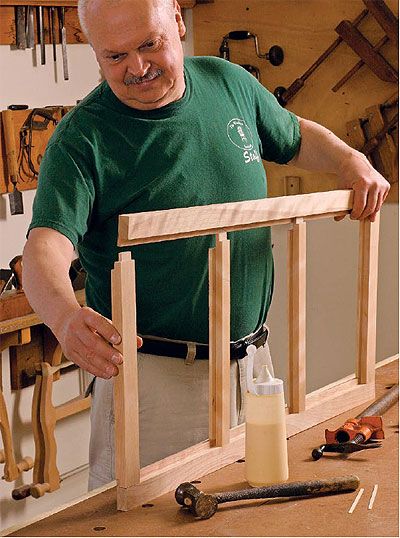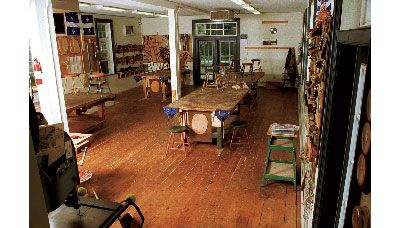
In 1994 he and his wife sold everything and emptied their savings to expand their teaching business.
Michael Dunbar wrote this article in 2000 about Going Pro. A lot changed over the last ten years but much of this advice remains current. Any tips that you would add to this list? Any feedback on what’s changed in the way woodworkers do business? Post a comment below.
Working wood is so pleasurable and satisfying that it is a rare woodworker who does not dream of quitting the day job and hanging a sign in front of the shop. I know firsthand why this dream is so attractive. I have been a self-employed woodworker for more than 30 years, and short of being independently wealthy, I would never want to be anything else.
My wife, Sue, and I are constantly involved in helping people make this dream a reality. While most of the more than 400 people who study with us each year are amateurs, about 20% are already deriving at least some income from their woodworking. Another 10% are in the planning stages of turning pro.
We are well-qualified career consultants. For 23 years of my career, I was a self-employed Windsor chair maker. I made a good living and was able to sell everything I made. And since 1994, Sue and I have run a thriving woodworking school. Prior to that Sue worked in public relations/marketing and political consulting. She also had her own political talk show on television. She left that work to run our new business (while I taught) and to raise our son. Besides making our school grow like a mushroom, she still conducts seminars for woodworkers who want help taking the big step or who are straggling as pros. Sue and I list eight big steps you have to make to go pro successfully. You can get the nuts and bolts of setting up a business from your lawyer, accountant and banker. I’m talking about the stuff they won’t tell you. And I know these methods work because they built our business.
How to succeed, in eight not-so-easy steps
1. Prepare yourself
I won’t sugarcoat it. Making a living working wood is tough, and most people fail or live hand to-mouth. To succeed and earn a decent income, you must be willing to pay the price of success and have the attitude that nothing is going to stop you.
Willing to work long hours and weekends?
Ask yourself the following questions, and make sure you give honest answers: Are you willing to work long hours and weekends? Are you willing to take financial risks and make lots of sacrifices? If any other considerations—vacations, trips, cars, security, leisure, hobbies, sports—are more important than your new business, keep your day job and save yourself a lot of grief. Otherwise, you are setting yourself up for a disaster to your self-esteem, your financial well-being and perhaps even your marriage.
We lost money for the first four years
For the first four years we were in the teaching business, we lost money. Because everything we owned was tied up in the business, we walked a financial tightrope. With our savings gone, one or two bad months would have sunk us. Today, we still work long hours. Most nights Sue and I are in the office until 6:30—long after our students and staff have gone home. It is a rare weekend that we do not work at least half a day. The business is always on our minds and is our most common topic of conversation.
We recently had a student from a rural Midwestern state express his desire to go home and make chairs for sale. He wondered aloud who would buy chairs in the $400 to $700 price range in the hardscrabble area where he lived. We advised that he find a way to sell his chairs in a more wealthy area.
“You mean, like a gallery?”
“Yes.”
“I don’t want to get wrapped up in all those hassles,” he said.
“Then move to a place where the inhabitants have more money.”
“I don’t want to leave where I am.”
“Then you really don’t want to make and sell chairs,” we concluded for him.
2. Prepare your family
Be sure that your spouse and older children share your dream. While it is possible to succeed without your spouse’s support, it is a lot harder. We know couples who have divorced over this issue. Your family has to be willing to sacrifice as well. Life is a lot more stressful if you are being pressured to take a cruise or vacation at a time when money is tight or a big job has to get done. Working for yourself takes lots of stamina and self-confidence. There will be days when you want to give up. At these low moments you need your life’s partner cheering you on, not saying, “I told you so.”
Together, examine your financial situation. Is your spouse willing and able to support the family during the lean first years? Do you have enough savings, and are you willing to risk that money? What will you do about health insurance, tuition payments, day care, and other expenses?
Marc Blanchette of Hampden, Maine, is one of Sue’s success stories. After working from his house he realized that he needed to be in a location with more traffic by his door. He held a powwow with his wife and three teenage sons and reached this compromise. They agreed to mortgage the house and to buy a 12-acre business property on Route 1, at the doorstep to Bar Harbor and Acadia National Park, sites visited by some 5 million people a year. When the kids graduate, Marc and his wife plan to build their new home next to the business. Meanwhile, Marc will commute.
3. Prepare your workspace
You probably already have a workspace. But as a pro, you also need an area where you can show your products. And because working wood is only part of the business, you also need an office. The three do not need to be in the same place, though it is handy to have them so. For years, my office was a spare bedroom, and we used the kitchen in our restored 18th-century house as a showroom.
|
The Dunbars’ showroom and office. Visitors can enter the showroom and take In the antique Windsor chairs and recent reproductions, while the office down a short hallway remains private. |
If your shop is in your house or garage, make sure in advance you are not violating any zoning ordinances. The city or town can cause more grief than you can imagine.
When you go pro your workshop becomes your place of business and needs to be treated that way. Most clients want to meet you and see where and how their purchase was made. Don’t let your shop’s appearance blow a sale. Spend some time thinking about the presentation your space makes.
4. Appear professional
Before customers start to call, think about preparing yourself to sound professional and credible. Practice answering the phone in a professional and courteous way. Teach your family to do the same. When you return a call, don’t have kids fighting in the background, the television playing or the dog barking.
An answering machine or voice mail is essential. You simply are not credible if people cannot reach you. Make sure your machine’s message is professional, not funny or quirky.
When customers arrive, greet them professionally. It is usually best to schedule visits when the kids are in school. Confine overly friendly or menacing dogs.
Everyone thinks that “self-employeds” do not really work, and your shop can quickly become a hangout. Someone who kills time by wasting yours is stealing from you. This has been a major problem for me for 30 years. Sue and I have learned to subtly but firmly discourage this.
Read Dunbar’s other tips: tip five on marketing and developing an identity for yourself and tips six through eight on working the media, pressing the flesh, and sales.



























Comments
I copied this article many years ago when I started my custom furniture business and tacked it on the wall next to my desk. I refer to often and it helps by giving me a morale boost when business is slow. Mike Dunbar is also an excellent writer and I would like to see more of him in future FWW issues and Pro Shop blogs.
Glad to hear it was useful. I'll forward your suggestion on. -Gina
Log in or create an account to post a comment.
Sign up Log in